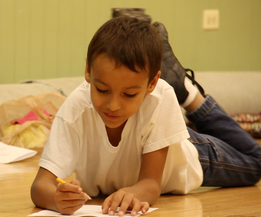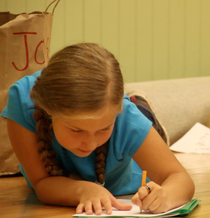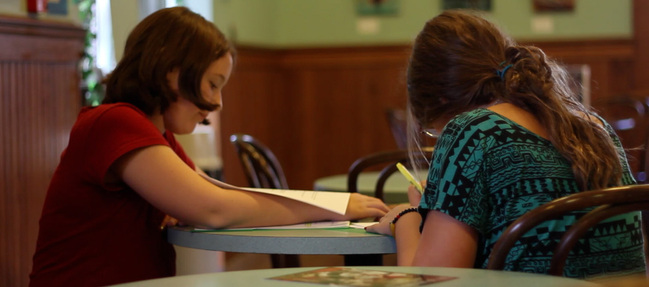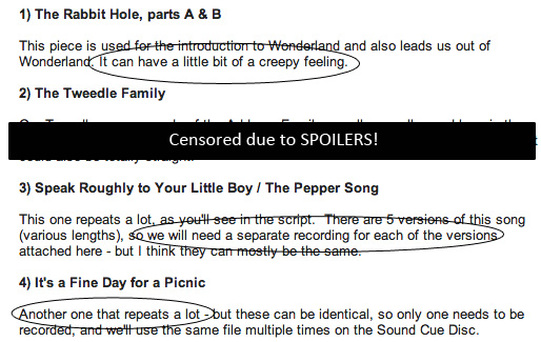
Memorization is a big part of your job as an actor. Getting off-book (that means all of your lines are memorized) and having your script out of your hands frees you up to explore your character's surroundings and physicality (how your character moves, stands, gestures, holds their body). But getting to the point at which you're comfortable leaving your script at your seat is hard to do! Here are a few tips to remember as you try to memorize your part.
Memorize scene by scene.
Don't try to tackle the whole play at once. Pick a scene and repeat-repeat-repeat until you feel comfortable. Then, move one to the next scene. Here's the trick, though - it's easy to get caught up working from the beginning, striving for perfection, and then never actually making it to the end of the script. Make sure you pace yourself. Choose a time limit for each scene - even set an alarm - and if the alarm goes off before you think you're word-perfect, that's okay. Move on to the next scene, and review the first one when you have a chance.
Think about your cues.
As you memorize, it's just as important to focus on your cues (the lines or actions that come before yours) as it is to focus on your lines. Think about how the line before yours could remind you what to say. Are you answering a question? Does the same word or sound get used in both lines? Why does your line make sense coming after your cue?
Speak out loud, with exaggerated articulation.
Repeating your cues and lines to yourself is great, and will help you become familiar with them, but speaking them out loud is much more likely to make them stick in your brain because you are using many parts of your body to communicate the line:
your eyes read the words if you have a script in your hand,
your mouth shapes the words,
the sounds are created by your vocal chords and articulators,
and your ears hear them as you speak.
your mouth shapes the words,
the sounds are created by your vocal chords and articulators,
and your ears hear them as you speak.
Over-exaggerate all of your consonants and vowels (each sound in each word) to help your muscle memory remember the line.
| What's "muscle memory"? Our brains and bodies are constantly looking for easier and easier ways to complete tasks. When we repeat an action over and over, our brain works together with our body to commit the task to memory, so that the next time we need to do it, we can complete it without thinking about it. A lot of the routines in our lives are related to muscle memory. |
For instance, say your family usually keeps a gallon of milk in the door of the refrigerator. Every morning, you walk to the fridge and pull the gallon out of the holder in the door.
One day, someone decides that the milk is better off on the bottom shelf instead of in the door.
The next morning, you walk to the fridge to get your milk. Even though you know that the milk is now being kept on the shelf, your muscle memory will most likely still cause you to open the refrigerator door and reach for the milk in the door. To override your muscle memory, you have to really think about where you should be reaching your hand. If you don't think about it as you're doing it, your hand will reach for the door storage.
That's because your brain and body have created a shortcut together, allowing you to pick the milk out of its usual spot in the fridge without applying any conscious brainpower to it.
One day, someone decides that the milk is better off on the bottom shelf instead of in the door.
The next morning, you walk to the fridge to get your milk. Even though you know that the milk is now being kept on the shelf, your muscle memory will most likely still cause you to open the refrigerator door and reach for the milk in the door. To override your muscle memory, you have to really think about where you should be reaching your hand. If you don't think about it as you're doing it, your hand will reach for the door storage.
That's because your brain and body have created a shortcut together, allowing you to pick the milk out of its usual spot in the fridge without applying any conscious brainpower to it.
Write them out.
Some actors also write their cues and lines out over and over to help with memorization. Others create notecards listing their cues and lines. Just like when you read out loud, writing uses a lot of different parts of your body - your eyes, your wrist, your fingers - and the more parts of your body you can use during memorization, the more likely your whole body is to remember your lines.
Memorize right before bed, and review right away in the morning.
Working on your lines right before you go to sleep can help your brain retain, or keep hold of, your lines better than working on them during the day. To maximize the effect, make sure to pick up your script first thing in the morning as well to review your lines!
Read with a partner.
If you have a friend, parent, or sibling who can help you out, great! Ask them to read each cue so that you can get in the habit of listening to what's said before your line and responding to it.
Be creative!
Put on a silly costume that suits your character. Act scenes out using dolls or friends. Put the words of your lines into the music of a song you like.
Take care of yourself.
Your brain gets tired from activity just like your body does. Make sure you're fueling it well with healthy food and lots of sleep. If you're working on your script for a long time, make sure to take a five-minute brain break every 15-30 minutes. Take a walk. Play with your dog. Turn on some music and dance. You'll come back refreshed and ready to work.








 RSS Feed
RSS Feed